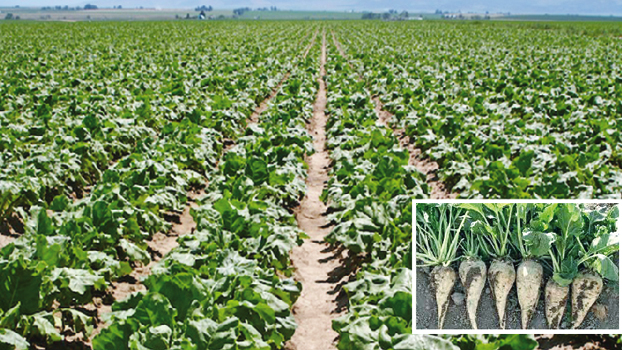Sugar beet ushers in new hope


Little known in Bangladesh, yet it is a potential substitute for sugarcane for growers of the crop in Bangladesh who have long been struggling to make their farming commercially viable.
Bangladesh Sugarcane Research Institute (BSRI) says the organisation has secured ‘encouraging’ results in piloting the cultivation of tropical sugar beets, a raw material of sugar, at different parts of the country.
According to BSRI sources, the institute has piloted beet cultivation on around 50 bighas of land and found that the average sugar production from beets is much higher than that from sugarcane.
BSRI officials say farmers have lost interest in sugarcane cultivation as it is no longer as viable as it was before, affecting the production of the crop and sugar locally.
They say commercial beet cultivation will not only help the growers run farming viably but will also make the raw material for sugar available round the year and thus help the mills operate without loss.
Agriculture scientists suggest that farmers can grow beet twice a year on the same land against only one sugarcane crop annually.
According to them, sugar recovery rate from beets is 14-15 percent against average 5-10 percent in case of sugarcane.
BSRI Chief Scientific Officer Dr Md Jahangir Alam said the sugar recovery from sugarcane at mills in the country has now dropped to 5-7 percent from 10 percent earlier because of low quality of sugarcane and obsolescence of machinery.
According to UN Food and Agriculture Organization (FAO), the use of beets as a raw material for sugar is growing across the world though it is new in Bangladesh.
A FAO publication titled ‘Agribusiness Handbook: Sugar beet white sugar’ shows that sugar beets accounted for 20 percent of the world's sugar production in 2009.
BSRI expects sugar beets will herald a new era for the country’s sugar manufacturing sector, which is operating with growing loss for continuous decline in the production of the raw material.
“We’ve already succeeded in cultivating sugar beets in a several-years pilot project. It is possible to address the country's sugar shortage through the cultivation of sugar beets,” said Dr Jahangir Alam, who is also BSRI Chief of Agriculture and Farming Systems Department.
BSRI Director General Dr Md Amzad Hossain told the Bangladesh Post that commercial sugar beet farming in different parts of the country has brighter prospects. “And its expanded cultivation could contribute to meeting the country’s sugar deficit.”
According to the institute, the total sugar cultivation area has declined to 180,000 acres from around 400,000 acres during the early years of independence as it is not longer commercially viable.
BSRI scientists said the institute has piloted beet cultivation on 12 bighas on the compounds of 12 sugar mills, 12 bighas in southern parts of the country, 12 bighas on BSRI premises, and another 12 bighas in other parts.
The government has allocated Tk 119 crore to bring Thakurgaon Sugar Mill, the only sugar mill in the country to produce sugar from beets, under the pilot project.
Apart from Thakurgaon Sugar Mill area, beets will be cultivated in the Panchagarh, Setabganj (Dinajpur) and Shyampur Sugar Mill areas of Rangpur.
Another BSRI Chief Scientific Officer and Head of Department of Biotechnology Dr Kuasha Mahmud said sugar beets’ sweetness and yield are much higher than sugarcane and that the crop can be harvested in only five-six months against 12-14 months in case of sugarcane.
Sugar mills in Bangladesh produce 65,000-70,000 tonnes of sugar annually against the domestic demand for 2 million tonnes of sugar and jaggery. The country has to import 1.4 million tonnes to cover the shortfall.
Sugar beet is a plant, the tuber of which contains high concentration of sucrose and it is being cultivated commercially in many countries for sugar production and ranks second to sugarcane for global sugar production.
Sugarcane is a 12-14-month crop and only 6 kgs of sugar is produced from 100 kgs of sugarcane. Sugarcane husk is used only as fuel in the kitchen.
On the other hand, sugar beet is a crop of only 5 months and 100 kgs of sugar beet yields about 14-15 kgs of sugar. Its pulp is used as animal feed and its leaves are used as green leafy vegetables, green manure and animal feed.




